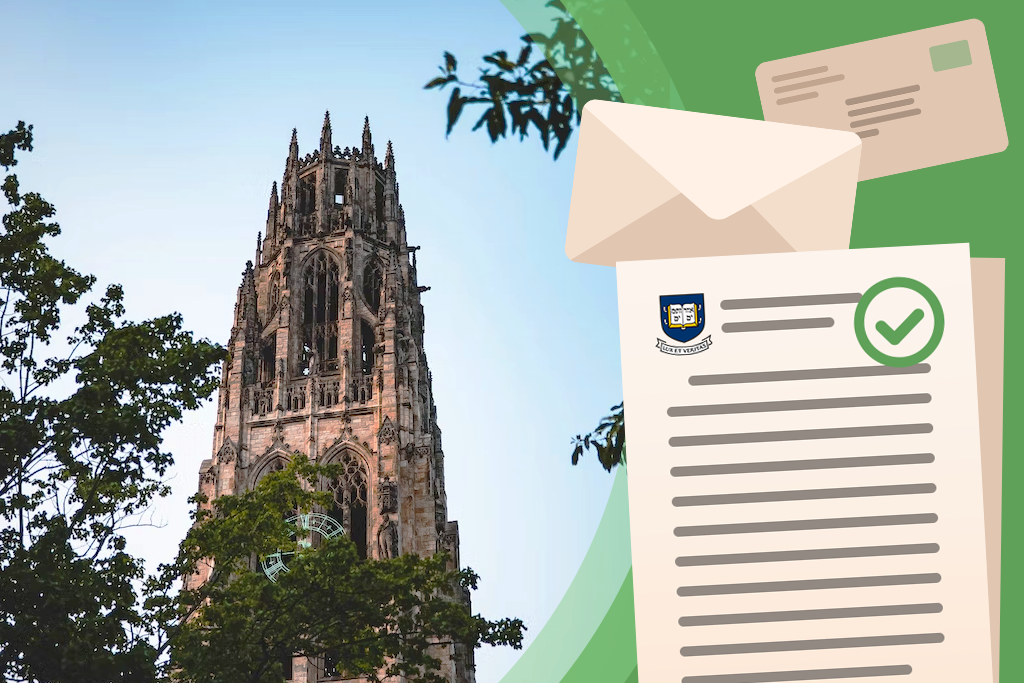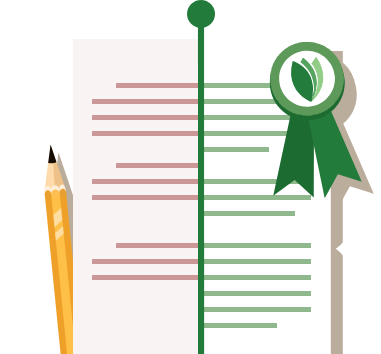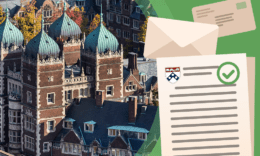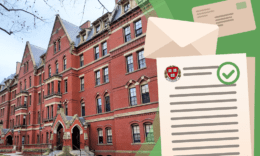Yale is a private Ivy League University that was founded in 1701 in New Haven, Connecticut. Then known as a theological school, the institution evolved rapidly over the centuries and now comprises fourteen schools (including the undergraduate school) and educates scholars in a broad range of disciplines. Among its alumni include politicians like Bill and Hillary Clinton, actors like Jodie Foster and Angela Bassett, and other influential people like Grace Hopper and Sonia Sotomayor.

With an acceptance rate in the single digits, Yale is a difficult school to get admitted to, but this post will make your journey easier by explaining every building block that leads to a great application.
Yale University Statistics
How Selective is Yale University?
In March 2022, the Yale Daily News reported that Yale’s admission rate for the class of 2026 was 4.46 percent, compared to 4.62 percent for the class of 2025 and 6.54 percent for the class of 2024.
Rankings
Yale is the third ranked university in the United States according to US News. As of fall 2021, Yale College (the undergraduate school) had about 6500 students, with a student-to-faculty ratio of 6:1, and an endowment of $42 billion, the second highest of any university.
SAT and ACT
Though as the Yale admissions website mentions, “there are no score cutoffs for standardized tests,” recent years’ ranges in the 25th to 75th percentiles have been:
- SAT-Evidence-Based Reading and Writing: 720-770
- SAT-Math: 740-790
- ACT Composite: 33-35
GPA
The average GPA of accepted applicants is 4.14. That said, like test scores, there is no GPA cutoff required for admission, and Yale’s admissions officers are aware that there are differences across schools. However, you definitely want to be toward the top of your class, taking as many rigorous classes as you can (and that your school offers).
Tuition and Financial Aid
Yale tuition is $62,250, with room and board costing an additional $10,500 and $7,950 respectively. However, Yale follows a need-blind policy in admissions, meaning that they do not take household income into account when making admissions decisions. Yale also has a robust financial aid program (meeting almost all of demonstrated need), with the average financial aid award totaling $52,743.

What is Yale University Looking For?
The High School Experience: Expectations
Every high school program is different, but Yale expects that you have taken advantage of the educational opportunities at your school. Admissions officers want to see four years of study in core subjects (English, science, math, social sciences, and foreign language), with an apt level of challenge balanced with subjects you’re especially interested in.
While you should strive to take on the most challenging courseload you can handle, admissions officers are aware that certain schools do not offer programs such as AP or IB classes, so you’ll only be held to the standard of academic opportunities that were available to you. If that means seeking out online courses, summer programs, or taking a class at a nearby community college, that counts too!
The Yale Admissions website stresses that choosing one class over another will rarely be the deciding factor in someone’s acceptance or rejection. What’s important to remember is that they emphasize seeing you as a whole student, thus you should consider shaping your academic trajectory in the way that makes most sense to you (and still meets Yale’s high standards).
The Art Supplement
You also have the option to submit an additional (optional) supplement in the arts with your application. You can submit your work in the visual arts, music, film, or dance, and it’s recommended to only submit if you feel strongly that your art would add color to your application in a way that the existing materials do not.
Though most applicants do not submit an arts supplement, it can help tip you over the scale should the arts faculty that review it find it to be worthwhile.
Yale’s guidelines about the art supplement can be found here.
The Interview
Most (but not all) students, especially those from whom the admissions committee requires more information, are asked to sit for an interview with a Yale College alumnus or current senior. The interview is optional, but strongly recommended if you’re invited to one, as the admissions committee reviews the interviewer’s report as part of your application, and it can give you another chance to showcase your personality or passion. Interviews are generally conducted where there is a Yale alumni presence, so if you’re not invited to one, don’t take it personally! It won’t harm your application.
The interview can be an important factor in your application if you’re prepared to make a good impression, and that means answering questions candidly, showing an earnest interest in Yale and its community, and being genuine. This is also your chance to ask a Yale graduate any questions about academics, student life, or life after Yale.
Yale University Application Requirements
Application Checklist
The Application
Yale accepts the Common Application, the Coalition Application, and the QuestBridge Application (if you qualify). No application platform carries any particular advantage; you’re free to choose whichever you’re most comfortable with.
Essays
The essays are a crucial component of your application to Yale. See this Next Admit blog post about how to approach Yale’s essays, as well as their own advice page.
Application Fee
The fee to apply to Yale is $80, although Yale also accepts fee waivers.
What You Need From Your School
School Report with Transcript
Your school report/transcript is arguably the most important puzzle piece in your application. Most schools have sent transcripts to colleges before and are familiar with the process, but if possible, we recommend checking it over before your school submits to make sure your coursework and grades are accurate. Note that as Yale is an academic institution, it seeks academic excellence from its students above all.
Counselor Recommendation
Yale requests one counselor recommendation as part of your application materials. Your guidance counselor should be able to provide additional context about you as a student, even if they do not know you well. If your counselor doesn’t know you personally, you can set up a meeting with them to go over the most important parts of your academics, extracurriculars, or personality that you’d like them to showcase in their letter.
Teacher Recommendations
Also requested are two teacher recommendations from teachers you’ve had for core subjects (English, math, science, social studies, or foreign language) in classes where you’ve done well. Ideally, these teachers know you as an engaged, passionate student, and have taught you in your junior or senior years of high school.
Similarly, it’s helpful to set up a meeting with the teachers you’d like to write recommendations for you well ahead of the deadline, so that you can share anything you’d like them to include in your letter, whether it’s academic or beyond.
Midyear Report
As soon as the final grades from your first marking period of your application year (if you haven’t already graduated from high school) are available, they should be sent along to Yale by a counselor or administrator from your school. Keep your grades up throughout senior year — you don’t want admissions officers to think you might be slacking off during your last year of high school.
What’s the Deal with Test-Optional?
As a continued response to the Covid-19 pandemic, Yale is not requiring standardized test scores from applicants for fall 2023. However, it can never hurt to send in a good test score, or even to take the SAT or ACT to see if you might make the cut.
Sharing your standardized test scores can also give admissions officers a fuller picture of who you are as a student. Supposedly, Yale’s research has shown that test scores can correlate with academic performance, which explains why they are considered. However, if you choose not to share them, more weight will be placed on the other academic components of your application.
One last thing to remember — perfect test scores are less likely to make up for middling grades than perfect grades are to make up for suboptimal test scores.
Currently, Yale is still following a test-optional policy, but that may change as public health conditions improve.
Extracurriculars and Yale: The Insider Info
Balancing Your Activities
Yale seeks students who have a rich extracurricular life, but the meaning of that can vary vastly from student to student. Involving yourself in a few different activities, whether in the arts, sports, activism, or academics, greatly boosts the strength of your application, especially if you’ve achieved something significant (state-level or higher) within those fields. While a high level of achievement is not necessarily required, what helps is showing motivation, improvement, and self-reflection within the clubs/sports you’ve pursued.
It’s also not necessary (and can even be detrimental!) to do everything that exists in your high school environment. You should choose a few (but a good mix of) activities that you’re passionate about to focus on, and build your narrative as a person who knows how to choose their battles wisely.
Special Circumstances
There are also non-standard activities that can give admissions officers a fuller idea of who you are, whether those are family/care responsibilities or a part-time job. Admissions officers understand that some students cannot keep up with a challenging academic course load and extensive extracurriculars if, for example, they have to care for a sibling or grandparent, or if they have to financially contribute to their household.
If that’s you, don’t hesitate to mention these experiences either in your essays or in your extracurriculars section. These types of life experiences tend to demonstrate maturity, responsibility, and dedication and shouldn’t be overlooked simply because they’re not conventional.
Deadlines
Yale’s Single Choice Early Action deadline is November 1. The regular decision application deadline is January 2. Decisions are released in mid-December and at the end of March respectively.
Recommended deadlines for financial aid applications are November 10 (early action) and March 15 (regular decision).





